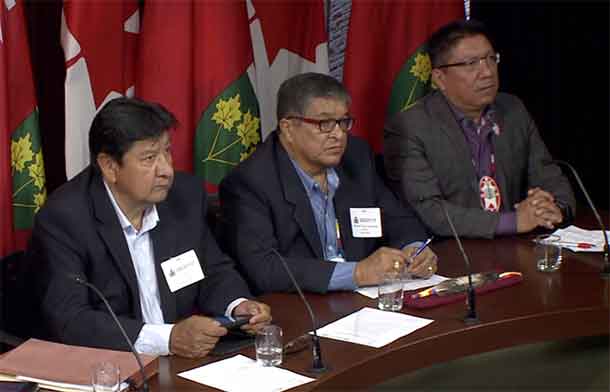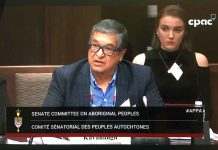
THUNDER BAY – OPINION – Recent deaths have once again confirmed the inability of the Thunder Bay Police Service (TBPS) to conduct credible investigations into the epidemic of deaths of NAN and Treaty No. 3 community members in Thunder Bay’s rivers.
On May 7, 2017, the body of 17-year-old Tammy Keeash, from North Caribou Lake First Nation, was found in the Neebing-McIntyre floodway. Less than two weeks later the body of 14-year-old Josiah Begg, of Kitchenuhmaykoosib Inninuwug, was also found in the river. These followed the death of Stacy DeBungee, from Rainy River First Nation, who was found in a river on October 19, 2015.
These deaths in the city’s waterways has caused a crisis of confidence in policing. Specifically, the credibility of investigations into the deaths of Indigenous people in the city’s waterways Stacy’s death, in fact, has triggered a systemic review of racism in the TBPS by the Office of the Independent Review Director (OIPRD).
As leaders of Nishnawbe Nation, Grand Council Treaty No. 3 and Rainy River First Nations, we have lost faith in the ability of local police to investigate the tragedies involving these three deaths, and the other Indigenous “River Deaths” around Thunder Bay.
Specifically, we have four key areas of concern
First, the TBPS has lost all credibility with the Indigenous community regarding the river deaths. The TBPS has irreparably damaged its credibility by announced that Stacy DeBungee’s death was “not… suspicious” only three hours after the body was recovered, before identity was verified, then announced that the death was “non-criminal” after only 25 hours. Police also announced “no evidence to indicate criminality” after Tammy Keeash’s death, even though she was a Junior Canadian Ranger who was familiar with water safety. Police then announced “no evidence” that Josiah Begg had gone near the river and called off searchers three days before his body was recovered in the river.
These cases are similar to investigations of five youth who drowned between 2000 and 2011, which were deemed non-criminal and closed even though an inquest in 2016 found that causes of death for three of them remained undetermined. The TBPS still ignores Indigenous voices and denies any basis for concern, despite sufficient evidence of racism for a systemic investigation by the OIPRD.
Second, the TBPS cannot credibly investigate these deaths. We have never suggested that the TBPS is responsible for the deaths; instead, the issue is its inability to provide credible and reliable police services in a time of crisis. There is justifiable community anxiety that requires a competent investigative agency to provide answers. We fear that failure to properly investigate and determine why the river deaths are occurring could lead to future deaths.
Third, the RCMP needs to be called in because the OPP lacks credibility. Rainy River First Nations and the DeBungee family sent three letters between July and September 2016 seeking to have the investigation transferred to another police service. Thunder Bay Police refused to transfer the investigation. The Police Chief noted that he met in person with the OPP Commissioner regarding the investigation of Mr. DeBungee’s death, and that the Commissioner “clearly expressed” that he would not entertain such a request “during the course of an outstanding OIPRD investigation.”
Since the OIPRD is currently investigating the deaths of Josiah Begg and Tammy Keeash as well as Mr. DeBungee, the OPP must be ruled out as a possible investigative body consistent with the reasoning behind the Commissioner’s prior refusal.
Fourth, the Thunder Bay Police Services Board appears to be dysfunctional. The Board has gone from stonewalling and refusing to comment regarding Indigenous issues to actively siding with the Police Association and taking an adversarial positions to First Nations. After repeated refusals to several direct requests to comment regarding the OIPRD systemic review, the Board broke its silence on May 25 through statements made the Vice-Chair, speaking, for reasons unknown to us, for the Board Chair.
Demonstrating that the Board has already pre-determined the outcome of the ongoing OIPRD review of systemic racism at the police service it is supposed to oversee, the Vice-Chair declared: “I don’t anticipate anything like that coming out… There are no facts that there is systemic racism in the Thunder Bay Police Service.” Notably absent was any consideration of the Indigenous perspective, except to deny its legitimacy.
The Board appears not to understand its role as a civilian oversight agency, to ensure that police provide “adequate and effective” services to “all” community members, as required by the Police Services Act. Instead, the Board has denied direct evidence of systemic failures and used community concerns as an opportunity to show solidarity with police instead of the public.
On May 29 we wrote to the Minister of Community Safety and Correctional Services to request the intervention of the RCMP to investigate the deaths of Stacy DeBungee, Tammy Keeash and Josiah Begg. The sooner a proper investigation happens, the sooner we will understand our losses, and be reassured that similar deaths of Indigenous people will not continue to occur because of police indifference.
We have also called for immediate action by the provincial authority over Police Boards – the Ontario Civilian Police Commission. We have requested an investigation of the failures of the Board and the immediate appointment of an administrator to oversee the Board, and are encouraged to learn that the OCPC has now launched an investigation.
These are very serious issues, and we do not raise them lightly. We have been unfairly criticized for ‘attacking’ the police, when all we are trying to do is get much-needed answers for the families and communities who have lost loved ones in the city’s rivers. We are not criticizing induvial officers and we are not pointing fingers, as we are accused of doing. We are simply asking for answers from the police and accountability by the Board that oversees them.
– Grand Chief Alvin Fiddler, Nishnawbe Aski Nation
– Ogichidaa Francis Kavanaugh, Grand Council Treaty #3dtdtudeee5wwrsrw
– Chief Jim Leonard, Rainy River First Nations
The views, opinions and positions expressed by all columnists and contributors are the author’s alone. They do not inherently or expressly reflect the views, opinions and/or positions of NetNewsLedger.





